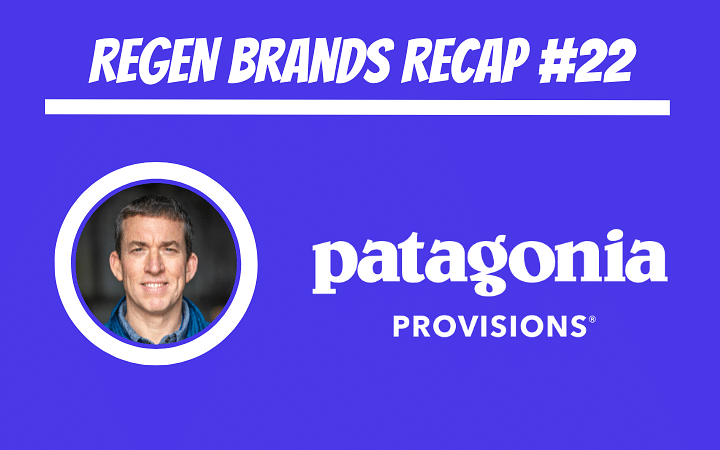
Paul Lightfoot @ Patagonia Provisions
Architecting Regenerative Supply Chains
Paul Lightfoot is the General Manager of Patagonia Provisions. Patagonia Provisions is the food arm of Patagonia focused on building regeneratively produced products that scale to broad commercial success.
The Brand
While best known for its outdoor gear and apparel, Patagonia launched its Provisions food and beverage division a decade ago to address the systemic issues around the current food system, recognizing the impact food could have on Patagonia’s overall mission to “save our home planet." Contrary to the current system that harms human health and the planet, Provisions is proving that food can be grown in a way that’s actually good for everyone – while creating market opportunities to transform the system for the better.
Their Product Development Rubric
To date, Provisions has built an eclectic mix of products across multiple categories that are all based around hero ingredients whose growing practices can aid in the fight against the climate crisis. The business has largely been in an "experimental phase" to this point, which Lightfoot acknowledges was appropriate and beneficial. His new mandate as General Manager is to focus the business in a way that makes regeneratively produced food commercially scalable.
The biggest challenge to do that? Making solid choices quickly about what products / categories Provisions should and shouldn’t be in. So Paul and his team created a rubric (a Venn diagram with four circles) that informs every decision they make.
- Quality – How does the product taste? What’s its nutritional value?
- Environmental Impact – This includes carbon footprint, biodiversity impact, etc.
- Marketplace Demand – Do customers want this? Can it create repeat purchases?
- Unit Economics – Will the product be able to scale? Can the supply chain support an adequate margin?

Paul would like to see Provisions enter at least one new category a year, and they’ve started building product "families" in some categories like pasta, beer, and seafood. For the future, they are looking at pantry staples – recognizing that there’s a tremendous impact (in terms of farmland practice adoption) to be made in the food people use every day to sustain their families.
“We make pasta with Kernza – a perennial grain that builds soil, restores farmland, sequesters carbon – it’s a hero grain. But we quickly realized a single item can’t succeed – a shopper will walk right by it in the store and building the supply chain is too expensive and complex. So instead, we’re building a whole category around kernza, launching a line of pasta items nationally with the Patagonia name. Now the consumer sees a pasta with an interesting story that’s delicious and reasonably priced, and we’re scaled commercially to make an impact.” – Paul
More Than A Story
Patagonia has a rich history of success – which Paul attributes to the brand putting quality first. For Provisions, quality is based on the three pillars of taste, nutrition, and food safety. Regenerative products have a storytelling advantage because they are at the highest intersection of taste, environmental impact, and nutrition. But how you tell that story to the consumer is really important. And while Patagonia has a rich history of great storytelling, those stories only get you so far.
For example, Provisions has launched a line of tinned mussels. These bivalves do a great job cleaning the ocean, they’re low impact, sustainable, and without the issues of the commercial seafood industry (aka, what Paul calls “the feedlot of the ocean”). But the product has also gone viral on TikTok, tastes great, has a long shelf life, and is affordable. It’s successful not just because of the sustainability story, but because all pieces of the rubric are satisfied.
“A brand must also have complete synchronicity across all elements of its business – from product quality to the storytelling to sales and marketing. Even though consumers are increasingly wanting to be part of the solution, and buyers are getting bullish on regenerative organic certification, your product needs more than a story to succeed. If you produce a brand with high environmental impact but low quality, you ultimately lose your impact because you’ve diminished buyer confidence in the process.” – Paul
<svg width="50px" height="50px" viewbox="0 0 60 60" version="1.1" xmlns="https://www.w3.org/2000/svg" xmlns:xlink="https://www.w3.org/1999/xlink"><g stroke="none" stroke-width="1" fill="none" fill-rule="evenodd"><g transform="translate(-511.000000, -20.000000)" fill="#000000"><g><path d="M556.869,30.41 C554.814,30.41 553.148,32.076 553.148,34.131 C553.148,36.186 554.814,37.852 556.869,37.852 C558.924,37.852 560.59,36.186 560.59,34.131 C560.59,32.076 558.924,30.41 556.869,30.41 M541,60.657 C535.114,60.657 530.342,55.887 530.342,50 C530.342,44.114 535.114,39.342 541,39.342 C546.887,39.342 551.658,44.114 551.658,50 C551.658,55.887 546.887,60.657 541,60.657 M541,33.886 C532.1,33.886 524.886,41.1 524.886,50 C524.886,58.899 532.1,66.113 541,66.113 C549.9,66.113 557.115,58.899 557.115,50 C557.115,41.1 549.9,33.886 541,33.886 M565.378,62.101 C565.244,65.022 564.756,66.606 564.346,67.663 C563.803,69.06 563.154,70.057 562.106,71.106 C561.058,72.155 560.06,72.803 558.662,73.347 C557.607,73.757 556.021,74.244 553.102,74.378 C549.944,74.521 548.997,74.552 541,74.552 C533.003,74.552 532.056,74.521 528.898,74.378 C525.979,74.244 524.393,73.757 523.338,73.347 C521.94,72.803 520.942,72.155 519.894,71.106 C518.846,70.057 518.197,69.06 517.654,67.663 C517.244,66.606 516.755,65.022 516.623,62.101 C516.479,58.943 516.448,57.996 516.448,50 C516.448,42.003 516.479,41.056 516.623,37.899 C516.755,34.978 517.244,33.391 517.654,32.338 C518.197,30.938 518.846,29.942 519.894,28.894 C520.942,27.846 521.94,27.196 523.338,26.654 C524.393,26.244 525.979,25.756 528.898,25.623 C532.057,25.479 533.004,25.448 541,25.448 C548.997,25.448 549.943,25.479 553.102,25.623 C556.021,25.756 557.607,26.244 558.662,26.654 C560.06,27.196 561.058,27.846 562.106,28.894 C563.154,29.942 563.803,30.938 564.346,32.338 C564.756,33.391 565.244,34.978 565.378,37.899 C565.522,41.056 565.552,42.003 565.552,50 C565.552,57.996 565.522,58.943 565.378,62.101 M570.82,37.631 C570.674,34.438 570.167,32.258 569.425,30.349 C568.659,28.377 567.633,26.702 565.965,25.035 C564.297,23.368 562.623,22.342 560.652,21.575 C558.743,20.834 556.562,20.326 553.369,20.18 C550.169,20.033 549.148,20 541,20 C532.853,20 531.831,20.033 528.631,20.18 C525.438,20.326 523.257,20.834 521.349,21.575 C519.376,22.342 517.703,23.368 516.035,25.035 C514.368,26.702 513.342,28.377 512.574,30.349 C511.834,32.258 511.326,34.438 511.181,37.631 C511.035,40.831 511,41.851 511,50 C511,58.147 511.035,59.17 511.181,62.369 C511.326,65.562 511.834,67.743 512.574,69.651 C513.342,71.625 514.368,73.296 516.035,74.965 C517.703,76.634 519.376,77.658 521.349,78.425 C523.257,79.167 525.438,79.673 528.631,79.82 C531.831,79.965 532.853,80.001 541,80.001 C549.148,80.001 550.169,79.965 553.369,79.82 C556.562,79.673 558.743,79.167 560.652,78.425 C562.623,77.658 564.297,76.634 565.965,74.965 C567.633,73.296 568.659,71.625 569.425,69.651 C570.167,67.743 570.674,65.562 570.82,62.369 C570.966,59.17 571,58.147 571,50 C571,41.851 570.966,40.831 570.82,37.631"></path></g></g></g></svg>View this post on Instagram
Creating Market Opportunities
Key to achieving their mission is creating real market opportunities that motivate farmers to convert to regenerative practices. Too many farmers are stuck in the current cycle, relying on more and more inputs at higher costs to hit yield targets even though they recognize it’s not sustainable for their land or bottom line.
“While many will argue that you can get higher yields with regenerative practices, the real story is you get better profits. There’s plenty of opportunity for farmers to make enough money growing food regeneratively, and it’s my job to help them understand that and to create market demand. I get to disrupt the current system, flip the current sequence, and start from scratch. We can focus on building high-quality products that have an impact, have the demand, and take market share away from our 'food enemies' (net-pen salmon farming, feedlot beef, and monocrop corn & soy).” – Paul
Our Path to 50% Market Share 4 Regen
Consumer demand will be the lever that changes the food system, and preserving the labeling standards and integrity of the Regenerative Organic Certification is critical. However, warns Paul, as regenerative gains traction in the marketplace, there’s a risk of it losing its meaning if we let big food abuse the labeling and certification. That’s why Provisions is pushing to keep these high standards, sometimes at the cost of commercial success.
Also critical to growth? Redirecting rather than rebuilding infrastructure. As Anthony and Paul assert in the episode, without putting existing infrastructure to better use, we’ll never be able to scale regenerative fast enough. Provisions is proving this mindset, having just test-launched kernza-based beer, starting with three geographic partners: Topa Topa in Southern California, Russian River in the Bay Area, and Hopworks Urban Brewery in Portland. They’ve established licensing partnerships with existing values-aligned brewers using the Patagonia label to attract their existing outdoor apparel customers who are environmentally conscious.
“Imagine if you decided to build a whole new brewery industry – all the wasted time and resources to recreate something that already exists. We have the infrastructure, the engineers, the salespeople – let’s just change it up and do it in a way that has a better impact.” – Paul
You can check out the full episode with Paul from Patagonia Provisions HERE.
Subscribe to future episodes of the ReGen Brands Podcast on your favorite podcast platform using the buttons below. You can help support our mission of growing regenerative CPG brands with a 5-star rating!
Stay engaged in the conversation by subscribing to our weekly newsletter, The ReGen Brands Weekly, and connecting with us on LinkedIn (Kyle & AC).
Your support of the show and these brands truly means the world to us. Thank you!
This ReGen Recap was produced with support from Kristina Tober
